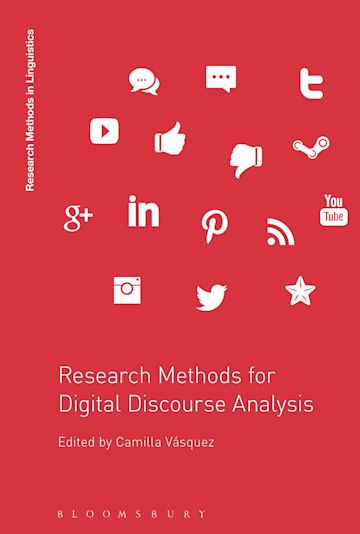Research methods for digital discourse analysis
 Introducing the key questions and challenges faced by the researcher of digital discourse, this book provides an overview of the different methodological dimensions associated with this type of research. Bringing together a team of experts, chapters guide students and novice researchers through how to conduct rigorous, accurate, and ethical research with data from a wide range of online platforms, including Facebook, Instagram, Twitter, YouTube, and online dating apps.
Introducing the key questions and challenges faced by the researcher of digital discourse, this book provides an overview of the different methodological dimensions associated with this type of research. Bringing together a team of experts, chapters guide students and novice researchers through how to conduct rigorous, accurate, and ethical research with data from a wide range of online platforms, including Facebook, Instagram, Twitter, YouTube, and online dating apps.
Research Methods for Digital Discourse Analysis focuses on the key issues that any digital discourse analyst must consider, before tackling more specific topics and approaches, including how to work with multilingual or multimodal data. Emphasizing concrete, practical advice and illustrated with plentiful examples from research studies, each chapter introduces a new research dimension for consideration, briefly exploring how other discourse analysts have approached the topic before using an in-depth case study to highlight the main challenges and provide guidance on methodological decision-making. Supported by a range of pedagogical tools, including discussion questions and annotated further-reading lists, this book is an essential resource for students and any researcher new to analyzing digital discourse.
zum Buch im ULB-KatalogPlus
zum Buch auf der Verlags-Website
Using AI for dialoguing with texts: from psychology to cinema and literature
 This concise volume offers an accessible introduction to state-of-the-art artificial intelligence (AI) language models, providing a platform for their use in textual interpretation across the humanities and social sciences.
This concise volume offers an accessible introduction to state-of-the-art artificial intelligence (AI) language models, providing a platform for their use in textual interpretation across the humanities and social sciences.
The book outlines the affordances of new technologies for textual analysis, which has historically employed established approaches within the humanities. Neuman, Danesi, and Vilenchik argue that these different forms of analysis are indeed complementary, demonstrating the ways in which AI-based perspectives echo similar theoretical and methodological currents in traditional approaches while also offering new directions for research. The volume showcases examples from a wide range of texts, including novels, television shows, and films to illustrate the ways in which the latest AI technologies can be used for „dialoguing“ with textual characters and examining textual meaning coherence.
Illuminating the potential of AI language models to both enhance and extend research on the interpretation of texts, this book will appeal to scholars interested in cognitive approaches to the humanities in such fields as literary studies, discourse analysis, media studies, film studies, psychology, and artificial intelligence.
zum Buch im ULB-KatalogPlus
zum Buch auf der Verlags-Website
Weitere Titel zu den Digital Humanities finden Sie z.B. über eine Suche im KatalogPlus.
